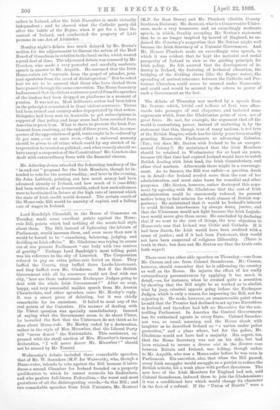The debate of Thursday was marked by a speech from ,
Mr. Sexton, which, trivial and tedious at first, rose after- wards into passages of real eloquence, and included some arguments which, from the Gladstonian point of view, are of great force. He met, for example, the argument that all the world is centralising power, instead of scattering it, by the statement that this, though true of many nations, is not true of the British Empire, which has for thirty years been steadily granting Home-rule Parliaments to advancing Colonies.. (Yes; but does Mr. Sexton wish Ireland to be an unrepre- sented Colony?) He maintained that the Irish Members should be retained in Westminster for at least six years, because till that time had expired Ireland would have to watch British dealing with Irish land, the Irish Constabulary, and other vital matters. Afterwards there might be a rearrange.. ment. As to finance, the Bill was unfair—a question dwelt on in detail—for Ireland needed more than the cost of her administration, and must raise loans for remedial and other purposes. (Mr. Sexton, however, rather destroyed this argu- ment by agreeing with Mr. Gladstone that the cost of Irish administration could be enormously reduced, its present motive being to find salaries for whole classes of British sup- porters.) He maintained that it would be Ireland's interest to avoid British interference by always doing justice, and that the Ulstermen would not fight because the Irish Legisla- ture would never give them cause. He concluded by declaring that if we went to the root of things, the true objection to, Home-rule was that Ireland was Celtic and Catholic. If it had been Saxon, the Irish would have been credited with a, sense of justice; and if it had been Protestant, they would not have been suspected of religious illiberality. (There is truth in that; but does not Mr. Sexton see that the truth cuts both ways ?)






































 Previous page
Previous page